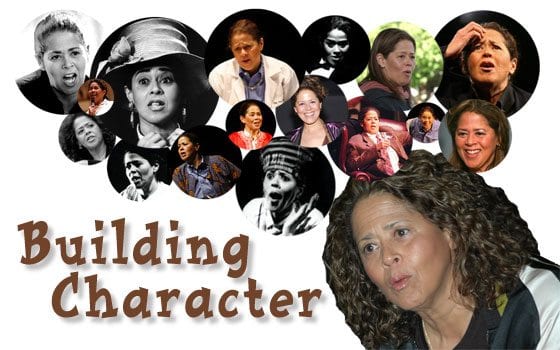With a new one-woman play, Anna Deavere Smith continues her commitment “to showing people they can walk in someone else’s shoes”

With a new one-woman play, Anna Deavere Smith continues her commitment “to showing people they can walk in someone else’s shoes”
The tall, slender woman with the tousled, shoulder-length hair has one of those faces that most have seen somewhere before.
The recognition may be because she has appeared in Hollywood movies and a hit television series.
Or perhaps it’s because of her work on a smaller stage, where she can become the incarnation of a Rwandan genocide survivor, an athlete or a dying cancer patient, or elicit a memory of a close friend who has endured adversity and survived with grace
Anna Deavere Smith becomes all these people and more in her new one-woman play “Let Me Down Easy.” In the show, which opens at the American Repertory Theatre (ART) on Sept. 12 and runs through Oct. 11, she explores the human condition by inhabiting an assortment of characters.
“When you tell a sad story, where is the hope?” she asks. “I’m focusing on grace.”
Smith says she was inspired to write “Let Me Down Easy” after she was invited by the Yale School of Medicine to conduct interviews with patients and doctors. From those meetings, she created a performance for the school’s lecture series.
The experience made an indelible impression on Smith, where she says she was left “… looking at the body and what happens to it.”
She decided to continue on that path, traveling to three countries in Africa. Stopping in Rwanda 10 years after the nation’s genocide, she spoke to victims of that atrocity. Her travels also took her to Uganda and South Africa, where she spoke with AIDS patients.
“It was a rich experience,” she pauses, lost in her thoughts about the voyage.
Asked whether the amount of death and despair she witnessed took a toll on her, she emphatically shakes her head. If anything, she says, she was left inspired by the people she met: “The human spirit, our resilience, never goes away.”
Those moments are incorporated into her play. Smith says she can offer perspective into another person’s life — inspiring sympathy, and possibly empathy.
“I think I am only a trigger for other people,” she explains.
The actress is known as a maverick in theater when it comes to taking on the personas of others and sparking dialogue about social issues. In 1993, she earned a Pulitzer Prize nomination for her play “Fires in the Mirror,” which tackled the race riot that exploded in the Crown Heights section of Brooklyn, N.Y., in August 1991. The conflict began after a Hasidic Jew accidentally lost control of his car and killed a 7-year-old Guyanese child crossing the street.
A year later, she gained more acclaim for “Twilight: Los Angeles 1992,” a play that examined similar subject matter — the riots sparked by the acquittal of four Los Angeles police officers accused of beating Rodney King after pulling him over for speeding. The incident was videotaped by someone passing by.
Smith interviewed many people during that time to recreate the tension on stage. “For a while there,” she says wryly, “I was the riot girl.”
Smith admits to taking the same approach in “Let Me Down Easy,” conducting a number of interviews and detailing the nuances of subjects’ speech or gestures.
“I got interested in the way people spoke, the noises they made,” she says. “I wanted to know, ‘What is the relation [between] the person and the noises they make?’ No one thumbprint is alike.”
The playwright admits that when she was younger, she loved to imitate different people, and was energized by various elements around her.
“When I was a little girl, I was a mimic,” she remembers. “I listened to jazz, I danced to speeches by FDR, I talked to hairdressers.”
While some may find her style off-putting, Smith says this is a journey she gladly takes. It is a departure from her most recent work on mainstream television, where she played national security advisor Nancy McNally from the popular show “The West Wing.” Does it bother her that more people may recognize her for that than for her emotionally charged one-woman plays?
“Some people don’t have a clue about what I do,” she says.
However, there are others who see these plays, and understand this side of her as well. Smith delights in that, too.
“I have dedicated my life to showing people they can walk in someone else’s shoes and bridge the divide of our differences,” she says.
Anna Deavere Smith’s “Let Me Down Easy” opens Sept. 12 and runs through Oct. 11 at the Loeb Drama Center, 64 Brattle Street, Cambridge. Tickets range from $39-$79. For show times, tickets and more information, visit www.amrep.org.






